Intro
Understand Protein Total Blood Test Results, including albumin and globulin levels, to diagnose conditions like liver disease, nephrotic syndrome, and nutritional deficiencies, with accurate interpretations and normal range values.
The protein total blood test is a crucial diagnostic tool used to assess the overall health of an individual. Proteins are essential nutrients that play a vital role in various bodily functions, including building and repairing tissues, producing enzymes and hormones, and maintaining fluid balance. Abnormal protein levels in the blood can indicate a range of health issues, from mild to severe. In this article, we will delve into the world of protein total blood test results, exploring their significance, interpretation, and implications for our health.
Protein tests are commonly used to diagnose and monitor conditions such as liver and kidney disease, cancer, and autoimmune disorders. The test measures the total amount of protein in the blood, which includes two main types: albumin and globulin. Albumin is produced by the liver and helps maintain fluid balance, while globulin is produced by the immune system and plays a key role in fighting infections. An imbalance of these proteins can indicate an underlying health issue, making it essential to understand the test results and their implications.
The importance of protein total blood test results cannot be overstated. By analyzing the levels of proteins in the blood, healthcare professionals can identify potential health problems early on, allowing for timely interventions and treatments. Moreover, the test can help monitor the effectiveness of treatments and track the progression of diseases. With the increasing prevalence of chronic diseases, the demand for protein total blood tests is on the rise, making it essential to comprehend the test results and their significance.
Understanding Protein Total Blood Test Results
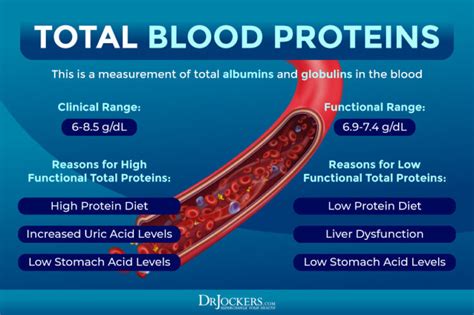
To interpret protein total blood test results, it is essential to understand the normal ranges of protein levels in the blood. The normal range for total protein is typically between 6 and 8.3 grams per deciliter (g/dL). Albumin levels usually range from 3.4 to 5.4 g/dL, while globulin levels range from 2.3 to 3.5 g/dL. Any deviation from these normal ranges can indicate an underlying health issue. For instance, low albumin levels can suggest liver or kidney disease, while high globulin levels can indicate an autoimmune disorder or cancer.
Protein Total Blood Test Results: Normal Ranges
The normal ranges for protein total blood test results are as follows: * Total protein: 6-8.3 g/dL * Albumin: 3.4-5.4 g/dL * Globulin: 2.3-3.5 g/dL It is essential to note that these ranges can vary slightly depending on the laboratory and the individual's age, sex, and other factors.Interpreting Abnormal Protein Total Blood Test Results
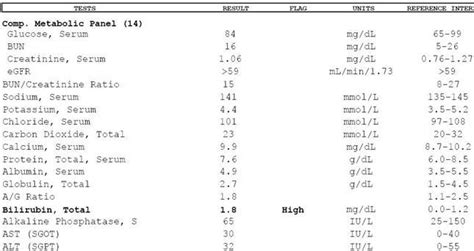
Abnormal protein total blood test results can indicate a range of health issues. Low protein levels can suggest malnutrition, liver or kidney disease, or certain autoimmune disorders. High protein levels can indicate dehydration, inflammation, or certain types of cancer. It is crucial to consult with a healthcare professional to determine the underlying cause of abnormal protein levels.
Some common causes of abnormal protein total blood test results include:
- Liver disease: Low albumin levels can indicate liver damage or disease.
- Kidney disease: Low albumin levels can indicate kidney damage or disease.
- Autoimmune disorders: High globulin levels can indicate an autoimmune disorder such as rheumatoid arthritis or lupus.
- Cancer: High protein levels can indicate certain types of cancer, such as multiple myeloma.
- Malnutrition: Low protein levels can indicate malnutrition or starvation.
Protein Total Blood Test Results: Common Causes of Abnormal Results
The following are some common causes of abnormal protein total blood test results: * Liver disease * Kidney disease * Autoimmune disorders * Cancer * Malnutrition It is essential to consult with a healthcare professional to determine the underlying cause of abnormal protein levels.Protein Total Blood Test Results: Clinical Significance
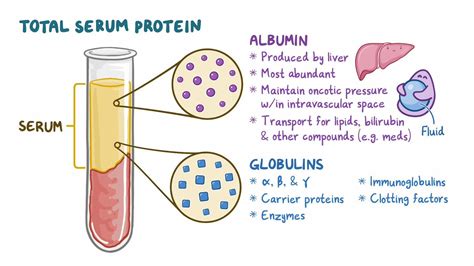
Protein total blood test results have significant clinical implications. Abnormal protein levels can indicate an underlying health issue, allowing for timely interventions and treatments. The test can also help monitor the effectiveness of treatments and track the progression of diseases.
Some clinical applications of protein total blood test results include:
- Diagnosing liver and kidney disease
- Monitoring cancer treatment
- Evaluating nutritional status
- Assessing immune function
- Monitoring autoimmune disorders
Protein Total Blood Test Results: Clinical Applications
The following are some clinical applications of protein total blood test results: * Diagnosing liver and kidney disease * Monitoring cancer treatment * Evaluating nutritional status * Assessing immune function * Monitoring autoimmune disorders Protein total blood test results play a vital role in clinical decision-making, allowing healthcare professionals to provide personalized care and treatment.Protein Total Blood Test Results: Limitations and Interferences
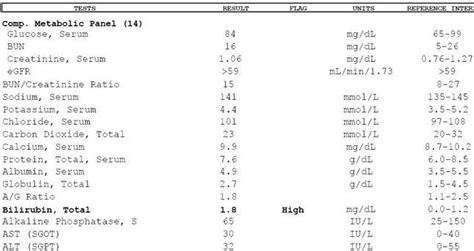
While protein total blood test results are a valuable diagnostic tool, there are some limitations and interferences to consider. Certain medications, such as corticosteroids and hormonal therapies, can affect protein levels. Additionally, laboratory errors or variations in testing procedures can impact test results.
Some common limitations and interferences of protein total blood test results include:
- Medications: Certain medications can affect protein levels.
- Laboratory errors: Laboratory errors or variations in testing procedures can impact test results.
- Age and sex: Protein levels can vary depending on age and sex.
- Nutritional status: Nutritional status can impact protein levels.
Protein Total Blood Test Results: Limitations and Interferences
The following are some common limitations and interferences of protein total blood test results: * Medications * Laboratory errors * Age and sex * Nutritional status It is essential to consider these limitations and interferences when interpreting protein total blood test results.Protein Total Blood Test Results: Future Directions
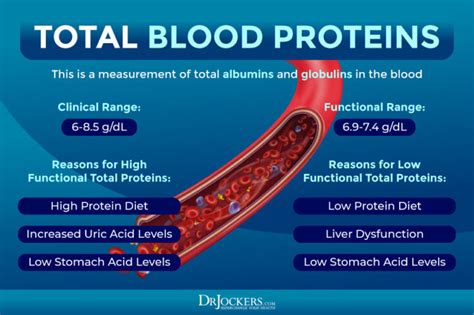
The field of protein total blood test results is constantly evolving, with advances in technology and testing procedures. Future directions include the development of more sensitive and specific tests, as well as the integration of protein total blood test results with other diagnostic tools.
Some potential future directions of protein total blood test results include:
- Development of more sensitive and specific tests
- Integration with other diagnostic tools
- Use of artificial intelligence and machine learning to interpret test results
- Personalized medicine approaches
Protein Total Blood Test Results: Future Directions
The following are some potential future directions of protein total blood test results: * Development of more sensitive and specific tests * Integration with other diagnostic tools * Use of artificial intelligence and machine learning to interpret test results * Personalized medicine approaches The future of protein total blood test results holds promise for improved diagnosis and treatment of various health conditions.What is the normal range for protein total blood test results?
+The normal range for total protein is typically between 6 and 8.3 grams per deciliter (g/dL). Albumin levels usually range from 3.4 to 5.4 g/dL, while globulin levels range from 2.3 to 3.5 g/dL.
What can cause abnormal protein total blood test results?
+Abnormal protein total blood test results can be caused by a range of factors, including liver and kidney disease, cancer, autoimmune disorders, and malnutrition.
How are protein total blood test results used in clinical practice?
+Protein total blood test results are used to diagnose and monitor various health conditions, including liver and kidney disease, cancer, and autoimmune disorders. The test can also help monitor the effectiveness of treatments and track the progression of diseases.
In conclusion, protein total blood test results are a vital diagnostic tool used to assess the overall health of an individual. By understanding the normal ranges, interpreting abnormal results, and considering the clinical significance, limitations, and interferences, healthcare professionals can provide personalized care and treatment. As the field continues to evolve, we can expect to see advances in testing procedures and the integration of protein total blood test results with other diagnostic tools. We invite you to share your thoughts and questions about protein total blood test results in the comments section below.
